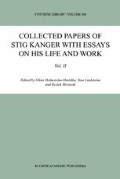Abstract
The primary purpose of this paper is to trace the intellectual effects of an encounter between two very different philosophers working in two seemingly unconnected areas. As will be seen, Stig Kanger’s meeting with Donald Davidson led the latter to modify his influential theory of radical interpretation and gave the former an inspiration to set up a rather striking paradox in preference logic. While the paradox can be dissolved, radical interpretation confronts some serious difficulties.
This paper is a revised version of Rabinowicz (1998). I wish to thank several people who have helped me with comments, references and suggestions: John Broome, Thorild Dahlquist, Sven Danielsson, Sören Hallden, Paul Needham, Jan Odelstad, Rysiek Sliwinski, Howard Sobel, Fredrik Stjernberg, Fredrick Stoutland, Göran Sundholm, and Folke Tersman. I am especially grateful to Donald Davidson, who has kindly supplied historical information, and to Sten Lindström, who has proved a theorem I needed for my argument, apart from being supportive in many other ways.
Access this chapter
Tax calculation will be finalised at checkout
Purchases are for personal use only
Preview
Unable to display preview. Download preview PDF.
References
Bell, J.L., and A.B. Slomson, 1969, Models and Ultraproducts: An Introduction, North Holland Publ. Comp., Amsterdam — London.
Broome, John, 1990, “Bolker-Jeffrey Expected Utility Theory and Axiomatic Utilitarianism”, Review of Economic Studies 57, pp. 477–502.
Davidson, Donald, 1980, “Towards A Unified Theory of Meaning and Action”, Grazer Philosophische Studien 11, pp. 1–12.
Davidson, Donald, 1982, “Expressing Evaluations”, Lindley Lectures, Lawrence, Kansas, University of Kansas.
Davidson, Donald, 1985, “A New Basis for Decision Theory”, Theory and Decision 18, pp. 87–98.
Davidson, Donald, 1986, Truth and Interpretation, ed. by E. LePore, Blackwell, New York.
Davidson, Donald, 1990, “The Structure and Content of Truth”, Dewey Lectures, The Journal of Philosophy 87, pp. 279–328.
Davidson, Donald, 1996, “The Folly of Trying to Define Truth”, The Journal of Philosophy 93, pp. 263–278.
Hansson, Sven Ove, 1998, Structures of Value. An Investigation of the Statics and Dynamic of Values and Norms, Lund Philosophy Reports, Department of Philosophy, Lund University.
Jeffrey, Richard C. 1983, The Logic of Decision, University of Chicago Press, Chicago and London, second revised edition; first edition 1965.
Kanger, Stig, 1980, “A Note on Preference Logic”, ThD 60 — Philosophical Essays dedicated to Thorild Dahlquist on his sixtieth birthday, Philosophical Studies publ. by Philosophical Society and Department of Philosophy, University of Uppsala, vol. 32, Uppsala, pp. 37–38.
Levi, Isaac, forthcoming, “Representing Preferences”, to be published in the Schilpp volume on Davidson.
Quine, Willard Van, 1960, Word and Object, MIT, Cambridge, Mass.
Quine, Willard Van, 1990, Pursuit of Truth, Harvard University Press, Cambridge, Mass., and London.
Rabinowicz, Wlodek, 1998, “Preference Logic and Radical Interpretation: Kanger Meets Davidson”, in Lars Lindahl, Jan Odelstad and Rysiek Sliwinski (eds.), Not Without Cause-Philosophical Essays Dedicated to Paul Needham on the Occasion of His Fiftieth Birthday, Uppsala Philosophical Studies 48, Uppsala University, Department of Philosophy.
Ramsey, Frank, 1950, “Truth and Probability”, in his Foundations of Mathematics and Other Logical Essays, ed. by R.B. Braithwaite, Routledge & Kegan Paul, London, pp. 156–198.
Rawling, Piers, 1996, “Davidson’s Measurement-Theoretic Reduction of the Mind”, draft.
Stoutland, Fredrick, forthcoming, “Davidson on Truth and Interpretation”, a book chapter.
Wilson, Neil, 1959, “Substances Without Substrata”, Review of Metaphysics 12, pp. 521–539.
von Wright, Georg Henrik, 1963, The Logic of Preference, Edinburgh University Press, Edinburgh.
Author information
Authors and Affiliations
Editor information
Editors and Affiliations
Rights and permissions
Copyright information
© 2001 Springer Science+Business Media Dordrecht
About this chapter
Cite this chapter
Rabinowicz, W. (2001). Preference Logic and Radical Interpretation Kanger Meets Davidson. In: Holmström-Hintikka, G., Lindström, S., Sliwinski, R. (eds) Collected Papers of Stig Kanger with Essays on His Life and Work. Synthese Library, vol 304. Springer, Dordrecht. https://doi.org/10.1007/978-94-010-0630-9_13
Download citation
DOI: https://doi.org/10.1007/978-94-010-0630-9_13
Publisher Name: Springer, Dordrecht
Print ISBN: 978-1-4020-0112-3
Online ISBN: 978-94-010-0630-9
eBook Packages: Springer Book Archive

